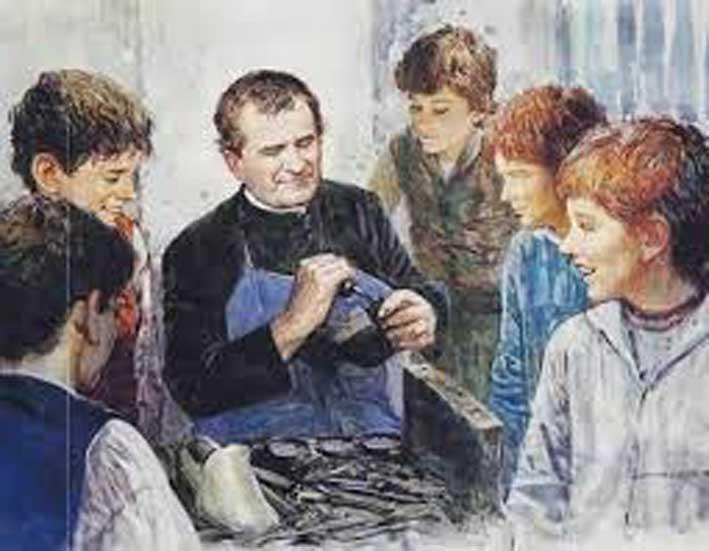Giovanni Bosco, son of Margherita' Occhiena and Francesco Bosco, born in Castelnuovo d'Asti on 16 August 1815 and died in Torino on 31 January 1988 at the age of 73. I think that only a few people had the fortune as Don Bosco did, that their personal doctor wrote the biography of their life. In fact, Don Bosco's personal doctor, Dr Giovanni Albertotti wrote the biography of Don Bosco from the physical, psychological and pathological aspect. However, this was only published after 59 years by Dr Albertotti's son, Giuseppe in 1929 in Genova. The biography was entitled Who was Don Bosco? A great man! A genius and a shining star of civilization. He was able to gain the esteem and admiration not only of those who were militant under the religious flag but especially by the poor, the abandoned, those against the Church and the young who had no education, were badly influenced by society and had their dignity abused and violated.

Don Bosco lived in difficult times when many young people had to leave the places around Torino and go to the city trying to find a future. They were poor and used to arrive in the city without any security and with nothing to dress and eat. They had no home to stay. They would try to work so as to earn a living and so be independent and be able to raise a family. However, these young people used to be abused while trying to earn a living. They worked long hours, gained very little and so they had to steal to keep alive and kill idleness which is the origin of all evil. Don Bosco, with his futuristic intelligence and pre-emptive action, used to organise the first contract of work for his beloved young people when they used to find work.

This was not enough! Don Bosco used to follow those who unfortunately went to prison. Accompanied by his friend and confessor Don Cafasso, he began to go to prison to teach, guide, educate and so convert them to start a new life through his educational philosophy: The Preventive System. We all know the strong impression which his visits to the prison left on Don Bosco. This was an episode that marked him deeply as he got to know the prisoners' stories of anger, hunger and exploitation. Don Bosco began from the heart to arrive at the boys' hearts. His first step was to gain their confidence, so that after having made friends with them, he could help them begin a new life, a life where light reigns. He helped them to overcome sin and make room for a life in Christ. He afterwards made a change in them, that is, he enabled them to rise in Christ. Youth today need people who are able to listen to them and to understand them. Don Bosco, in his educational method, teaches us that those who work with youth must have the art of listening to them. To listen to them is not simply to hear what they have to say. The educator does not listen in order to give counsel as an adult or as someone with more experience: advice given in this way is often not acceptable to the young.
The educator must get out of his own universe and accept the youth in the world s/he lives in, what s/he thinks and speaks. To listen to a person is not only an intellectual acceptance of another's view, but it is to free that person from his/her prejudices, from his/her judgements or from a possessive self-assurance to permit the youth to be truly himself/herself.

DON CAFASSO
This does not mean an aloofness on the part of the listener but rather a strong personal attachment to intimacy which enables him/her to listen calmly to one whose life, thoughts and actions are often paradoxical and contradictory. To listen to youths, the educator must accept them and go along with them, while at the same time respecting their personality which is always one and unique. Don Bosco was convinced that the educator must not become involved in the life and actions of the young person s/he is educating, so as to make the person dependent upon him/her. This would deprive the young person of his/her own responsibility. Don Bosco used to look at the young in the light of Christ who is a brother and a friend. Every young man is within reach of his/her salvation.
Today the insecurity of the future makes the young aggressive and violent with themselves and with others. Many times, their growth is not harmonic. They badly need examples, patterns, with whom they can identify themselves with. Youth today demand from us authenticity, freedom, sincerity and confidence. Sometimes they do not understand and they escape into passions, violence, drugs and sex.
In his times, Don Bosco lived for his boys, he was able to listen to them. Many times, he was directed by the boys themselves. Don Bosco was flexible, creative and original with each and every boy. The situation of a youth must help us to choose the best and most adequate approach. This is a very important principle in the Educative Project of Don Bosco. Love is the best place where a young person can find himself/herself. Love calls for more love. Don Bosco invites us to teach the young to overcome and fight all diffidence.
Education is the preferred way and the privileged means of evangelizing and the proclamation of the Gospel. This is the raison d'etre of our educational way. The young are waiting for us to save them. Tomorrow will be too late.